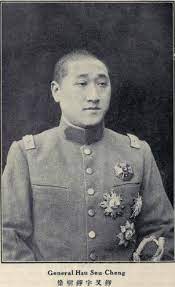Chang Chia-sen 張嘉森 T. Chün-mai West. Carsun Chang Chang Chia-sen (1886-), known as Carsun Chang, a leading supporter of Liang Ch'ich'ao's ideas and movements, worked for the establishment of constitutional government in the early 1900's. Prominent in the attempt to focus attention in China on cultural and educational activities, he studied philosophy in Germany and […]






